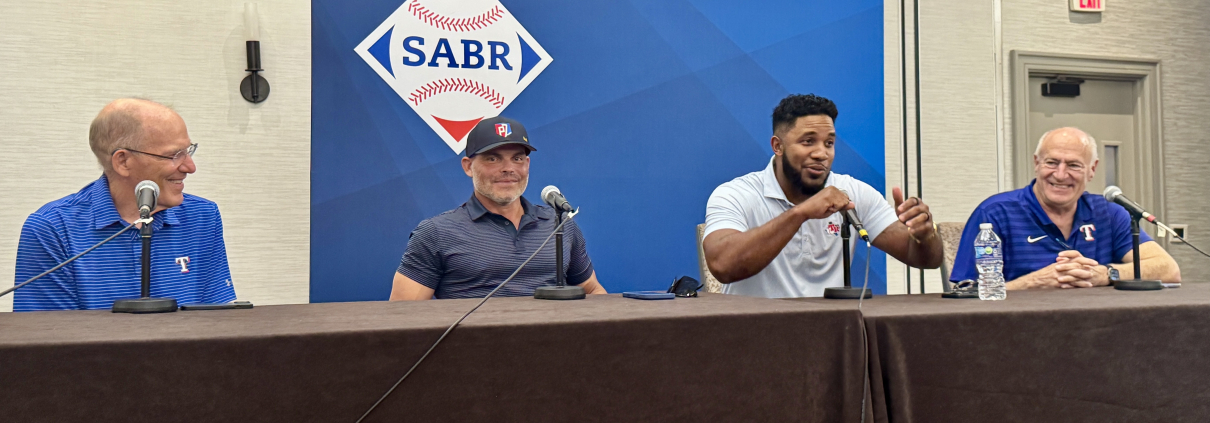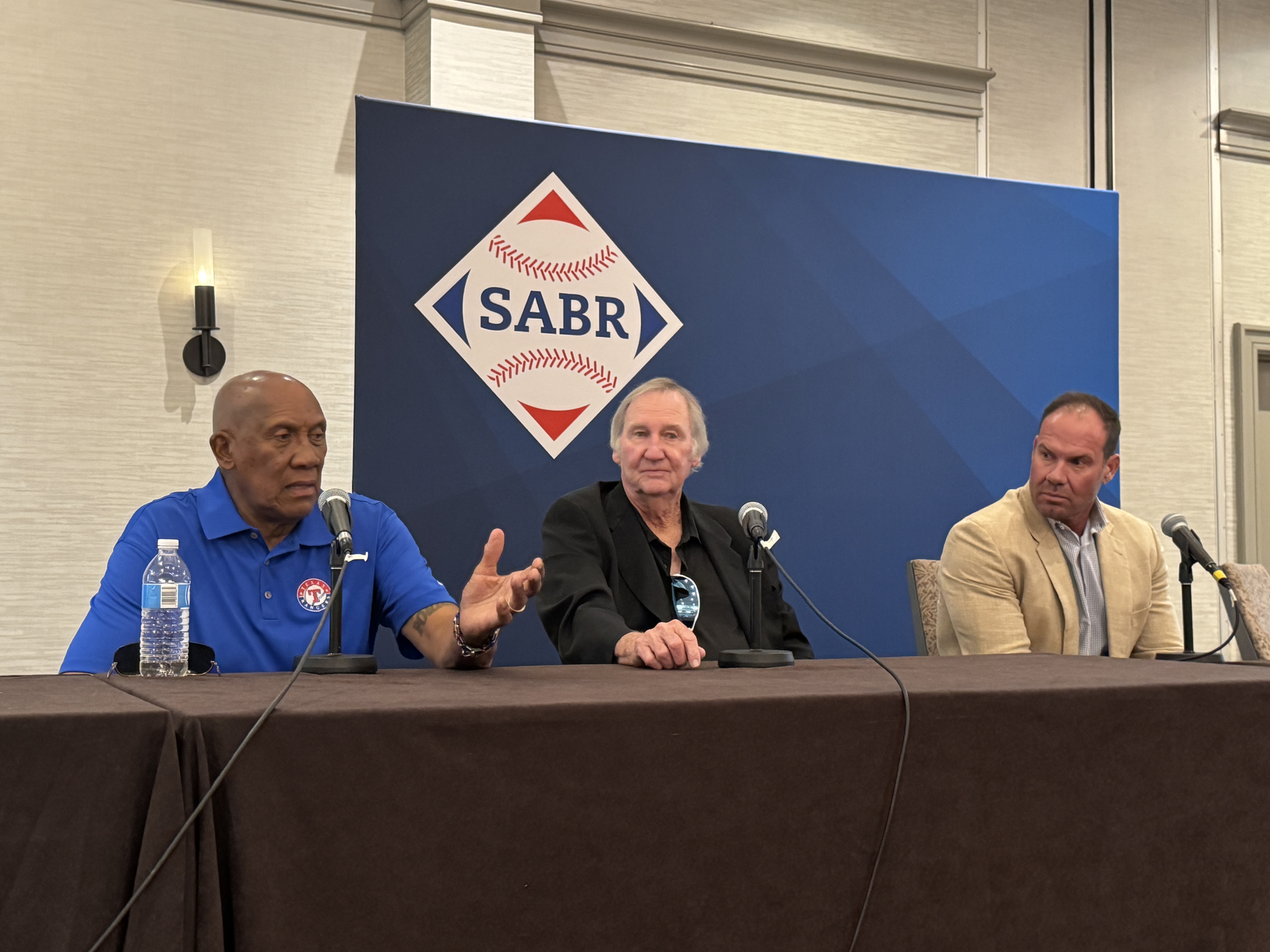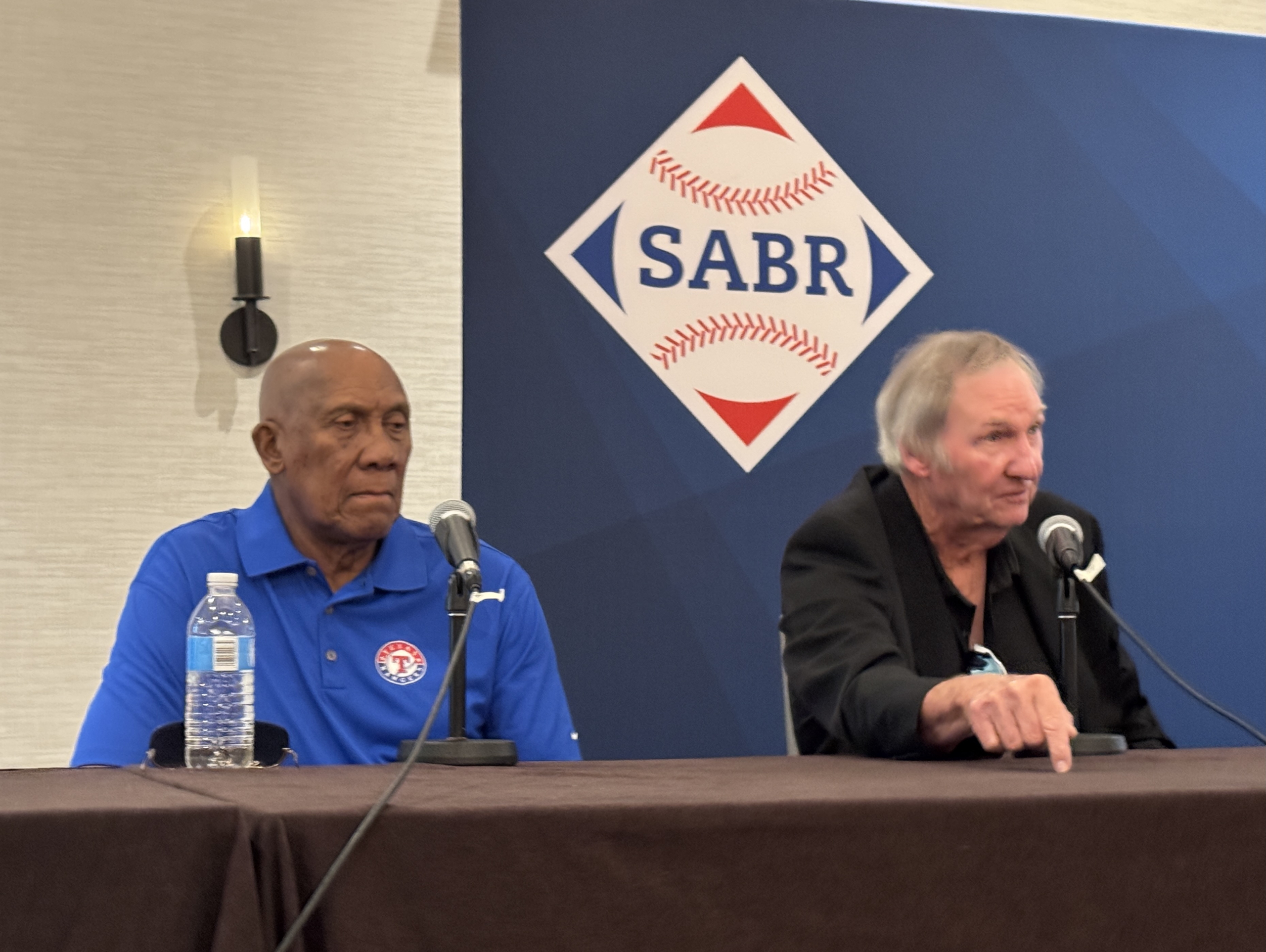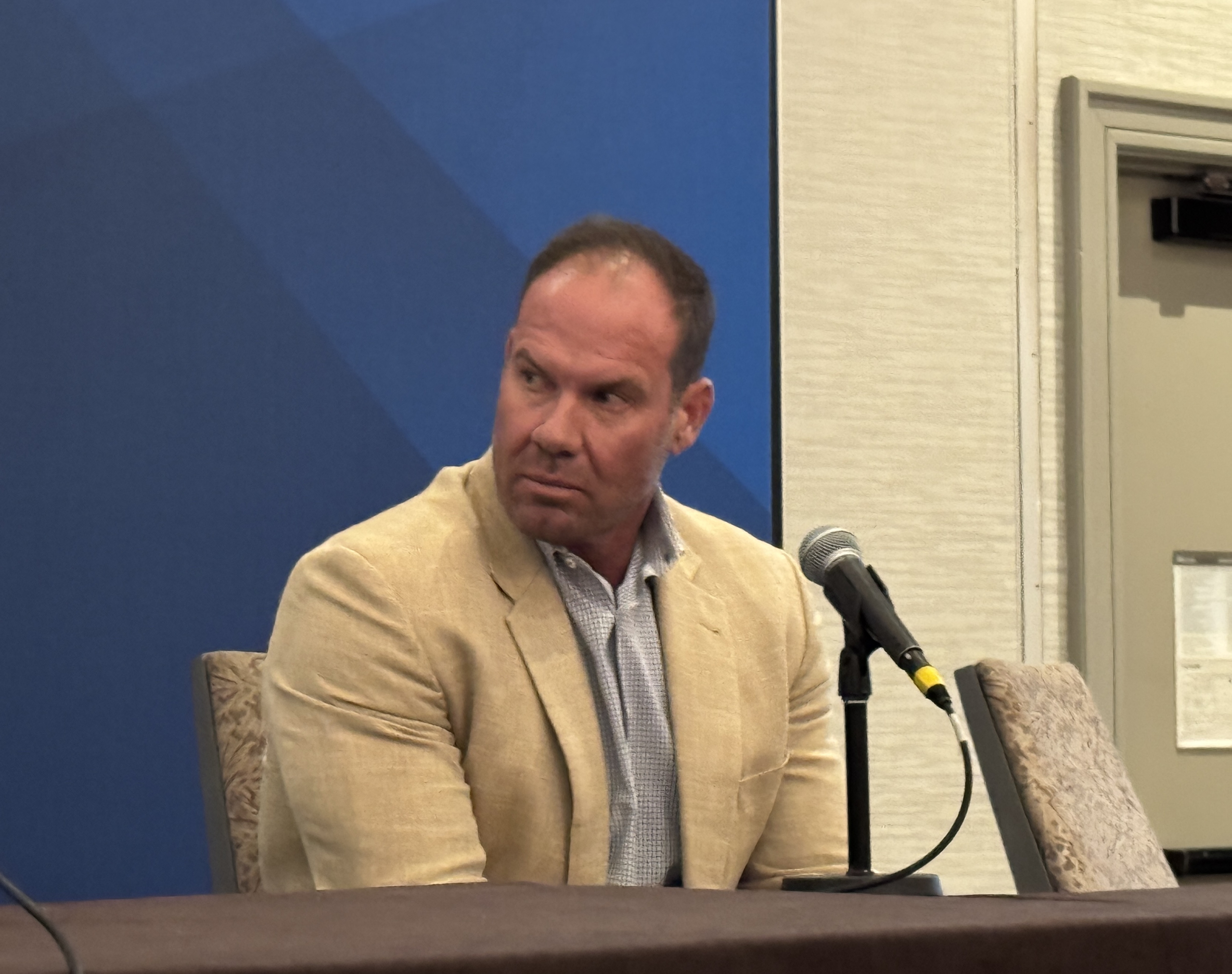SABR 53: Listen to highlights from Texas Rangers Pitchers Panel with Ferguson Jenkins, Charlie Hough, and Colby Lewis
On Friday, June 27, 2025, the Texas Rangers Pitchers Panel was held at SABR 53 at the Westin DFW Airport Hotel in Irving, Texas.
Panelists included Ferguson Jenkins, the first native of Canada to be inducted into the National Baseball Hall of Fame who won a career-high 25 games with the Texas Rangers in 1974; Charlie Hough, one of just two pitchers in major-league history with at least 200 career wins and 60 saves who made his first All-Star team at age 38 with the Rangers in 1986; and Colby Lewis, who helped lead the Rangers to four American League West Division titles and two World Series appearances. The moderator was Evan Grant of the Dallas Morning News.
- Audio: Click here to listen to the SABR 53 Pitchers Panel (59:43; MP3)
Here are some highlights:
ON FACING DISCRIMINATION AS A BALLPLAYER
- Jenkins: “Well, segregation was still real popular when I signed (with the Philadelphia Phillies) in 1962 out of high school. They just had the reunion for players of color who played in Little Rock a month ago, with Dick Allen, Marcelino López, Ricardo Quiroz, and myself … a Cuban, Panamian, American, Canadian, four of us. We were in Little Rock that first time in 1963. I felt safe on the field, nobody ever bothered me. You’d hear the odd word here and there. … But the Phillies put us there for a reason, to this day I don’t know why. … Alex Johnson (who joined the Arkansas Travelers in 1964) didn’t like it because we always had to give our money to a White player so they could buy us our food on road trips. And then they’d bring us our food back to the bus and we’d eat on the bus. … In Tampa, Florida, we stayed at a brothel. After the ballgame, the bus dropped us off at a fancy hotel and then (we’d go) to a Black area and we got our rooms. … And in St. Pete, we stayed at a funeral home. They embalmed the bodies in the basement, the second floor was where the caskets are, and on the first floor was three bedrooms. Alex Johnson would not go to sleep. He slept on an armchair. ‘Oh no, I can’t sleep, it’s just creepy.’ … But we survived, all of us.”
ON LEARNING HOW TO THROW THE KNUCKLEBALL
- Hough: “It was a bad arm that started it off. In 1969, my shoulder was awful. It was my third year pitching in Double-A. And I went to the instructional league and a minor-league coach named Goldie Holt said to me the first day I was there, ‘Have you ever tried to throw a knuckleball?’ I said, ‘Show me how.’ And he just put my hand on the ball and showed me the grip and he said, ‘Just push it out.’ And then I played catch for five minutes and I threw one that didn’t spin. I don’t know why it felt right. … And I walked in to the clubhouse, (Tommy) Lasorda was running the club, and I said, ‘From now on I’m going to throw the knuckleball.’ And he said, ‘Well, you better because you have no chance at making it the other way.’ … This was in October 1969. And in August 1970, I got a five-inning save against the Cubs in Chicago on my second day in the big leagues. I had absolutely no idea what I was doing with it. I just threw it as hard as I could toward the catcher.”
ON WHICH HITTERS GAVE YOU THE MOST TROUBLE
- Jenkins: “Roberto Clemente was a tough out with Pittsburgh. They were in our division with the Cubs. I faced him at 19 years old in winter ball. He seemed like he wasn’t interested. But during the season, he was tough. Way off the plate, deep in the batter’s box, charged the ball. He got his share of hits off me. Him and Pete Rose were probably the two toughest guys in the National League for me. I got (Willie) Mays out easy and (Henry) Aaron. I don’t know why, but I did. I used to pitch Pete down and away, let him go to left field. And he’d oblige me and hit it over the shortstop. … With Reggie Jackson, I could just throw my glove out there and he’d fly out.”
- Hough: “You remember the name Mark Salas? He was a backup catcher. Whenever I pitched against his team, he was the catcher, the star, the (cleanup) hitter. In (1987), he was in Minnesota and they were battling the Angels for first place. And I’m sitting in the clubhouse on the trainer’s table with Bill Ziegler. The radio is on and I got a cigarette and a crossword puzzle. They announced that Mark Salas has been traded to the Yankees for Joe Niekro. And I looked at Bill and said, ‘We win the game. I’ll shut ’em out if he’s not playing.’ I was ahead 2-1 and I went out to pitch the ninth inning and I hear that awful voice, ‘Now batting, Mark Salas.’ The trade wasn’t done until midnight so he stayed. I threw one pitch and he hit it into the second deck, a home run that tied the game. No-decision. And then he goes to New York and a few weeks later, he had like five RBIs off me.”
- Lewis: “Jim Thome was one of my tougher outs. I faced him quite a few times in Chicago and then when he went over to Minnesota late (in his career). One time I threw a heater in and I broke his bat. He goes to get another bat. I’m like, ‘OK, I’ve got him set up. I’m going to back-door a breaking ball right now. I haven’t shown him any yet.’ It’s 0-2 and he takes me oppo to left field for a homer. Next at-bat, same thing. I start him off with a heater in and break his bat. Somehow it gets by (Mitch) Moreland at first base and squiggles down to right field for a double. He had two home runs off me on another day. … Man, how do I get this guy out?”
ON CHANGING APPROACHES IN TODAY’S GAME
- Hough: “I think lineups are deeper today. There are middle infielders who hit 30 homers. In a sense it’s tougher to pitch today. The strike zone is a little tighter, but it’s easier to strike people out. Now it’s part of the game. … I don’t think there’s much difference with any one hitter. Great hitters, you attack them the same way. Change speeds, breaking balls, knock somebody down, low and away, up and in. It’s still hard to hit.”
- Lewis: “You used to be able to develop relationships with umpires. They knew you were going to throw more strikes, so you’d get more calls. All these umpires (today) get judged by how many strikes are in the box and (it affects) who gets to go to the postseason and who doesn’t. The framing has gotten a little better with catchers. But when I was coming up, you’d have (umpire Jim) Wolf throwing knuckleballs back to you and joking around. You’d develop relationships and get more strikes here and there. … As a young pitcher, in one of my first starts, I felt like I wasn’t getting any calls on both sides of the zone. And about the third inning, the umpire came down to the dugout and said, ‘Stay right there, kid.’ And I knew I had that reassurance that I was going to start getting these strike calls, because I wasn’t throwing a fit on the mound or anything.”
For more coverage of SABR 53, visit SABR.org/convention.
Originally published: July 9, 2025. Last Updated: July 9, 2025.





